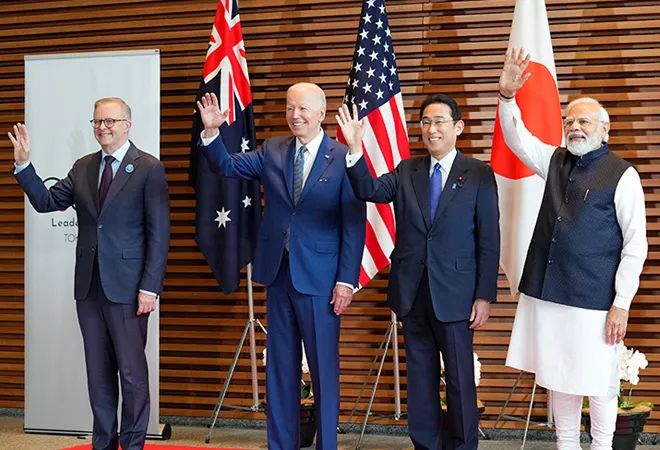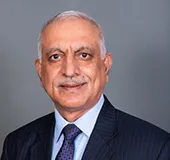
A Recap
Of the four Quad summits held thus far in rapid succession, the first and the fourth are of special significance. The maiden summit, conducted virtually in March 2021, under the shadow of the COVID-19 pandemic and increased Chinese belligerence, formalised this cooperative arrangement. It recognised that the four countries (Australia, India, Japan, the US) “bring diverse perspectives” but “are united in a shared vision for the free and open Indo-Pacific”. The vision outlined under the ‘Spirit of the Quad’ joint statement aimed to build upon the areas of convergence. Expanding its scope beyond the one contained in the grouping’s original nomenclature ‘The Quadrilateral Security Dialogue’, it sought to make its objectives more broad-based. The new focus was on development-linked initiatives to drive the common good and cooperative security, whilst addressing contemporary geopolitical challenges. The second summit made incremental progress by adding working groups to the three announced after the maiden summit (vaccines, critical and emerging technologies, and climate), and expanding cooperation in a few other areas. The third summit reemphasised the commitment of the four countries to the region.
The new focus was on development-linked initiatives to drive the common good and cooperative security, whilst addressing contemporary geopolitical challenges.
The fourth summit was held in Tokyo on 24 May 2022, in the backdrop of the ongoing Russia–Ukraine war, and its ramifications. The reality of the two economic shocks in quick succession, another humanitarian crisis soon after the one witnessed in Afghanistan, the looming geopolitical uncertainty, and the parallels being drawn between the situation in Eastern Europe and the Indo-Pacific made this summit much more important and relevant.
The Indo-Pacific Economic Framework and the Quad
A day before the Quad summit, the Indo-Pacific Economic Framework for Prosperity (IPEF) was launched by the US President, in the presence of the Prime Ministers of India and Japan. Other than the US, it has 12 participating countries at present, whose nod had been obtained by the US in the run-up to the summit. These countries will undertake “collective discussions towards future negotiations.” The IPEF has been projected as a new age economic arrangement, and not a mere trade facilitation pact that generally aims at rationalising or eliminating tariffs and enabling market access. It seeks to deepen economic engagement amongst partners for “continued growth, peace, and prosperity.” The joint statement indicated that lessons learnt from the pandemic and other developments in the region necessitated a new approach. It highlighted four pillars under this framework: Trade (free, fair, and inclusive); Supply Chains (diverse, transparent, and secure); Clean Energy, Decarbonisation, and Infrastructure (technologies, finance, connectivity); Tax and Anti-Corruption (for fair competition and common standards). However, from the joint statement, it can be surmised that the IPEF is currently more of a vision statement than a framework, and substantive groundwork will be needed by the participating countries to evolve a comprehensive framework that can be executed on the ground. It would be desirable if the execution part of the framework is enunciated in the coming months, to provide clarity and sustain the momentum.
Inevitably, comparisons will be made between the IPEF, Regional Comprehensive Economic Partnership (RCEP), and the Comprehensive Protocol for Trans-Pacific Partnership (CP-TPP), and the promise of IPEF as a new-age economic arrangement must find suitable articulation in terms of delivery.
The IPEF joint statement also invites other Indo-Pacific partners that share “goals, interests and ambition for the region” to join the initiative. However, the US is keen that the current IPEF partners discuss the process and criteria for additional members to join. This aspect could also be included in the revised comprehensive framework. Inevitably, comparisons will be made between the IPEF, Regional Comprehensive Economic Partnership (RCEP), and the Comprehensive Protocol for Trans-Pacific Partnership (CP-TPP), and the promise of IPEF as a new-age economic arrangement must find suitable articulation in terms of delivery. It is not clear if the countries that are already part of RCEP and CP-TPP will need to adapt or transition, and how such an adaptation or transition may be undertaken. The new US Indo-Pacific Strategy released in February 2022 had outlined the plan to launch and lead IPEF. The fact it was launched a day prior and not soon after the Quad summit makes it clear that it is a US-led and not a Quad-led initiative. At the same time, the US is likely to seek strong support from the Quad countries to take the IPEF discussions forward.
The Tokyo Summit and the Roadmap
The joint statement issued after the Quad summit in Tokyo on 24 May 2022, is more comprehensive in comparison to the first three summits (the statement after the third meeting in March 2022 had been termed as ‘Joint Readout’). It has endeavoured to bring more clarity to the broad framework for cooperation, by outlining eight specific areas. These include Peace and Stability; COVID-19 and Global Health Security; Infrastructure; Climate; Cybersecurity; Critical and Emerging Technologies; Quad Fellowship; Space; and Maritime Domain Awareness and HADR. The Ukraine war finds mention, but the statement evades the tricky question of finding common grounds to deal with the same. A better mutual understanding is, however, indicated concerning North Korea and Myanmar. The broad thrust is to move forward on the Quad agenda, without being constrained by specific areas of divergence amongst the Quad countries. Their common position against the militarisation of disputed features, the dangerous use of coast guard vessels and maritime militia, and efforts to disrupt other countries’ offshore resource exploitation activities have been stressed. Increased emphasis on cooperation with the Pacific Island states has been indicated, which will require urgent action given some recent developments. Quad cooperation with multilateral institutions, and on terrorism and violent extremism are important steps, but specific deliverables will need to be mutually agreed upon.
The broad thrust is to move forward on the Quad agenda, without being constrained by specific areas of divergence amongst the Quad countries. Their common position against the militarisation of disputed features, the dangerous use of coast guard vessels and maritime militia, and efforts to disrupt other countries’ offshore resource exploitation activities have been stressed.
Overall, the joint statement indicates continuity in the broad plan for development-linked cooperative security for the region, through affirmative and constructive initiatives. The progress made by the Quad since its first summit has been covered in the joint statement, conveying that delivery under the Quad banner is beginning to become tangible, and much more can be expected in the coming months. It also sends a message that the salience of the Indo-Pacific region has only gone up due to the current situation in Eastern Europe and that the Quad will be a key partnership in shaping its environment in the coming years.
A comprehensive Quad joint statement and the launch of IPEF are key developments, with long-term implications for the region. There are some common strands between the IPEF and the Quad joint statements, such as infrastructure and climate, and synergy between the Quad and the IPEF on these aspects would be desirable. Understandably, a security framework for the Indo-Pacific region in due course, as a follow-up to the economic framework will be much harder, though it is not inconceivable. It could begin with an Indo-Pacific Maritime Security Cooperation Framework. As and when this path is explored, the role of the Quad will be critical.
The views expressed above belong to the author(s). ORF research and analyses now available on Telegram! Click here to access our curated content — blogs, longforms and interviews.




 PREV
PREV


